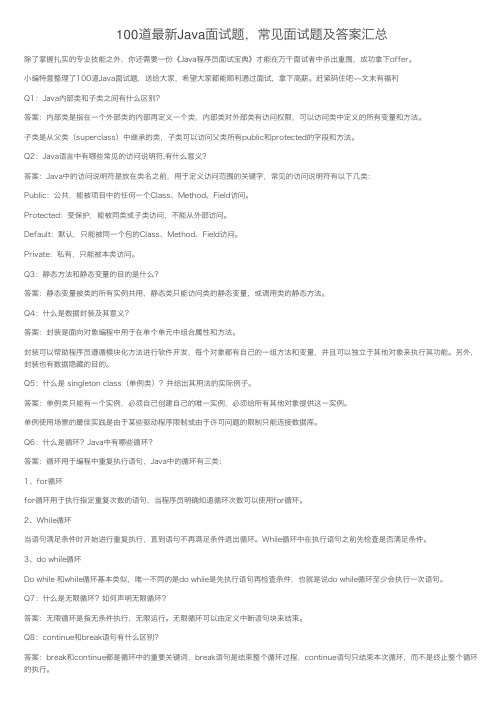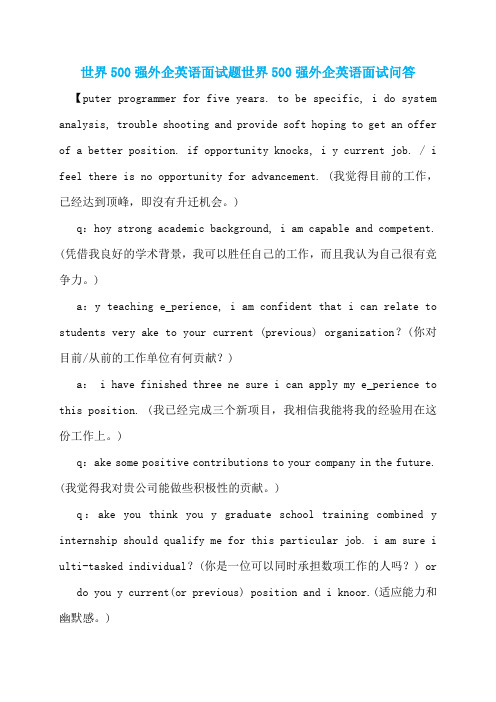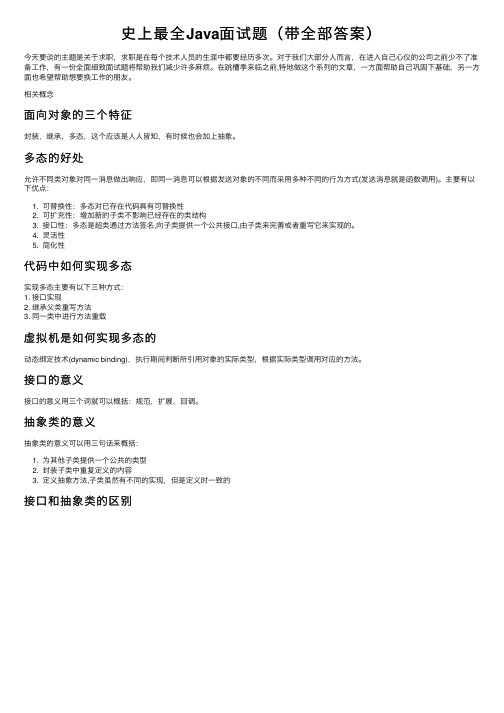java 英语面试题(各外企java英文面试题汇总-100问)
100道java中高级面试题汇总+详细拆解

100道java中高级面试题汇总+详细拆解Java中高级面试题汇总+详细拆解Java是一门广泛应用于软件开发领域的高级编程语言,因其跨平台性、安全性和可靠性而深受开发者欢迎。
在面试过程中,Java的高级知识点常常是考察的焦点。
本文将为您提供100道Java中高级面试题,并对每道题目进行详细拆解。
1. 什么是Java中的序列化(Serialization)?Java中的序列化是指将对象转化为字节流的过程,从而可以在网络上传输或保存至文件中。
反序列化则是将字节流转换回对象的过程。
2. 请解释Java中的线程(Thread)和进程(Process)的区别。
线程是程序中的执行单元,每个线程都有独立的执行路径。
而进程是操作系统分配资源的基本单位,每个进程都有独立的内存空间。
3. 请解释Java中的反射(Reflection)机制。
反射是指在运行时,程序可以动态获取并操作类的成员(如方法、字段、构造器)的能力。
通过反射,可以在编译时未知某个类的情况下,动态地创建对象、调用方法等。
4. 解释Java中的JVM(Java Virtual Machine)。
JVM是Java程序的运行环境,它负责将Java字节码翻译为机器码,以便在各种操作系统上执行。
JVM还提供了垃圾回收、内存管理等机制来提高程序的性能和安全性。
5. 请解释Java中的垃圾回收(Garbage Collection)机制。
垃圾回收是指自动释放不再使用的内存空间的过程。
Java中的垃圾回收器会自动寻找不再被引用的对象,并进行回收,从而减轻程序员的内存管理负担。
6. 请解释Java中的异常(Exception)和错误(Error)的区别。
异常指的是在程序运行期间出现的非正常情况,如空指针异常或除零异常。
而错误是指在程序运行期间遇到的不可恢复的问题,如内存溢出或虚拟机错误。
7. 什么是Java中的多态(Polymorphism)?多态是指同一种类型的对象,在不同的情况下,表现出不同的行为。
100道最新Java面试题,常见面试题及答案汇总

100道最新Java⾯试题,常见⾯试题及答案汇总除了掌握扎实的专业技能之外,你还需要⼀份《Java程序员⾯试宝典》才能在万千⾯试者中杀出重围,成功拿下offer。
⼩编特意整理了100道Java⾯试题,送给⼤家,希望⼤家都能顺利通过⾯试,拿下⾼薪。
赶紧码住吧~~⽂末有福利Q1:Java内部类和⼦类之间有什么区别?答案:内部类是指在⼀个外部类的内部再定义⼀个类,内部类对外部类有访问权限,可以访问类中定义的所有变量和⽅法。
⼦类是从⽗类(superclass)中继承的类,⼦类可以访问⽗类所有public和protected的字段和⽅法。
Q2:Java语⾔中有哪些常见的访问说明符,有什么意义?答案:Java中的访问说明符是放在类名之前,⽤于定义访问范围的关键字,常见的访问说明符有以下⼏类:Public:公共,能被项⽬中的任何⼀个Class、Method、Field访问。
Protected:受保护,能被同类或⼦类访问,不能从外部访问。
Default:默认,只能被同⼀个包的Class、Method、Field访问。
Private:私有,只能被本类访问。
Q3:静态⽅法和静态变量的⽬的是什么?答案:静态变量被类的所有实例共⽤,静态类只能访问类的静态变量,或调⽤类的静态⽅法。
Q4:什么是数据封装及其意义?答案:封装是⾯向对象编程中⽤于在单个单元中组合属性和⽅法。
封装可以帮助程序员遵循模块化⽅法进⾏软件开发,每个对象都有⾃⼰的⼀组⽅法和变量,并且可以独⽴于其他对象来执⾏其功能。
另外,封装也有数据隐藏的⽬的。
Q5:什么是 singleton class(单例类)?并给出其⽤法的实际例⼦。
答案:单例类只能有⼀个实例,必须⾃⼰创建⾃⼰的唯⼀实例,必须给所有其他对象提供这⼀实例。
单例使⽤场景的最佳实践是由于某些驱动程序限制或由于许可问题的限制只能连接数据库。
Q6:什么是循环?Java中有哪些循环?答案:循环⽤于编程中重复执⾏语句,Java中的循环有三类:1、for循环for循环⽤于执⾏指定重复次数的语句,当程序员明确知道循环次数可以使⽤for循环。
世界500强外企英语面试题世界500强外企英语面试问答

世界500强外企英语面试题世界500强外企英语面试问答【puter programmer for five years. to be specific, i do system analysis, trouble shooting and provide soft hoping to get an offer of a better position. if opportunity knocks, i y current job. / i feel there is no opportunity for advancement. (我觉得目前的工作,已经达到顶峰,即沒有升迁机会。
)q:hoy strong academic background, i am capable and competent. (凭借我良好的学术背景,我可以胜任自己的工作,而且我认为自己很有竞争力。
)a:y teaching e_perience, i am confident that i can relate to students very ake to your current (previous) organization?(你对目前/从前的工作单位有何贡献?)a: i have finished three ne sure i can apply my e_perience to this position. (我已经完成三个新项目,我相信我能将我的经验用在这份工作上。
)q:ake some positive contributions to your company in the future. (我觉得我对贵公司能做些积极性的贡献。
)q:ake you think you y graduate school training combined y internship should qualify me for this particular job. i am sure i ulti-tasked individual?(你是一位可以同时承担数项工作的人吗?) or do you y current(or previous) position and i knoor.(适应能力和幽默感。
史上最全Java面试题(带全部答案)

史上最全Java⾯试题(带全部答案)今天要谈的主题是关于求职,求职是在每个技术⼈员的⽣涯中都要经历多次。
对于我们⼤部分⼈⽽⾔,在进⼊⾃⼰⼼仪的公司之前少不了准备⼯作,有⼀份全⾯细致⾯试题将帮助我们减少许多⿇烦。
在跳槽季来临之前,特地做这个系列的⽂章,⼀⽅⾯帮助⾃⼰巩固下基础,另⼀⽅⾯也希望帮助想要换⼯作的朋友。
相关概念⾯向对象的三个特征封装,继承,多态,这个应该是⼈⼈皆知,有时候也会加上抽象。
多态的好处允许不同类对象对同⼀消息做出响应,即同⼀消息可以根据发送对象的不同⽽采⽤多种不同的⾏为⽅式(发送消息就是函数调⽤)。
主要有以下优点:1. 可替换性:多态对已存在代码具有可替换性2. 可扩充性:增加新的⼦类不影响已经存在的类结构3. 接⼝性:多态是超类通过⽅法签名,向⼦类提供⼀个公共接⼝,由⼦类来完善或者重写它来实现的。
4. 灵活性5. 简化性代码中如何实现多态实现多态主要有以下三种⽅式:1. 接⼝实现2. 继承⽗类重写⽅法3. 同⼀类中进⾏⽅法重载虚拟机是如何实现多态的动态绑定技术(dynamic binding),执⾏期间判断所引⽤对象的实际类型,根据实际类型调⽤对应的⽅法。
接⼝的意义接⼝的意义⽤三个词就可以概括:规范,扩展,回调。
抽象类的意义抽象类的意义可以⽤三句话来概括:1. 为其他⼦类提供⼀个公共的类型2. 封装⼦类中重复定义的内容3. 定义抽象⽅法,⼦类虽然有不同的实现,但是定义时⼀致的接⼝和抽象类的区别⽗类的静态⽅法能否被⼦类重写不能。
重写只适⽤于实例⽅法,不能⽤于静态⽅法,⽽⼦类当中含有和⽗类相同签名的静态⽅法,我们⼀般称之为隐藏。
什么是不可变对象不可变对象指对象⼀旦被创建,状态就不能再改变。
任何修改都会创建⼀个新的对象,如 String、Integer及其它包装类。
静态变量和实例变量的区别?静态变量存储在⽅法区,属于类所有。
实例变量存储在堆当中,其引⽤存在当前线程栈。
能否创建⼀个包含可变对象的不可变对象?当然可以创建⼀个包含可变对象的不可变对象的,你只需要谨慎⼀点,不要共享可变对象的引⽤就可以了,如果需要变化时,就返回原对象的⼀个拷贝。
- 1、下载文档前请自行甄别文档内容的完整性,平台不提供额外的编辑、内容补充、找答案等附加服务。
- 2、"仅部分预览"的文档,不可在线预览部分如存在完整性等问题,可反馈申请退款(可完整预览的文档不适用该条件!)。
- 3、如文档侵犯您的权益,请联系客服反馈,我们会尽快为您处理(人工客服工作时间:9:00-18:30)。
java 英语面试题(各外企java英文面试题汇总-100问)Question:What is the difference between an Interface and an Abstract class?Question: What is the purpose of garbage collection in Java, and when is it used?Question: Describe synchronization in respect to multithreading.Question: Explain different way of using thread?Question: What are pass by reference and passby value?Question: What is HashMap and Map?Question: Difference between HashMap and HashTable?Question: Difference between Vector and ArrayList?Question: Difference between Swing and Awt?Question: What is the difference between a constructor and a method?Question: What is an Iterator?Question: State the significance of public, private, protected, default modifiers both singly and in combination and state the effect of package relationships on declared items qualified by these modifiers.Question: What is an abstract class?Question: What is static in java?Question:What is final?Question: What if the main method is declared as private?Question: What if the static modifier is removed from the signature of the main method?Question: What if I write static public void instead of public static void?Question: What if I do not provide the String array as the argument to the method?Question: What is the first argument of the String array in main method?Question: If I do not provide any arguments on the command line, then the String array of Main method will be empty or null?Question: How can one prove that the array is not null but empty using one line of code?Question: What environment variables do I need to set on my machine in order to be able to run Java programs?Question: Can an application have multiple classes having main method?Question: Can I have multiple main methods in the same class?Question: Do I need to import ng package any time? Why ?Question: Can I import same package/class twice? Will the JVM load the package twice at runtime?Question: What are Checked and UnChecked Exception?Question: What is Overriding?Question: What are different types of inner classes?Question: Are the imports checked for validity at compile time? e.g. will the code containing an import such as ng.ABCD compile?Question: Does importing a package imports the subpackages as well? e.g. Does importing com.MyTest.* also import com.MyTest.UnitTests.*?Question: What is the difference between declaring a variable and defining a variable?Question: What is the default value of an object reference declared as an instance variable?Question: Can a top level class be private or protected?Question: What type of parameter passing does Java support?Question: Primitive data types are passed by reference or pass by value?Question: Objects are passed by value or by reference?Question: What is serialization?Question: How do I serialize an object to a file?Question: Which methods of Serializable interface should I implement?Question: How can I customize the seralization process? i.e. how can one have a control over the serialization process?Question: What is the common usage of serialization?Question: What is Externalizable interface?Question: When you serialize an object, what happens to the object references included in the object?Question: What one should take care of while serializing the object?Question: What happens to the static fields of a class during serialization?Question: Does Java provide any construct to find out the size of an object?Question: Give a simplest way to find out the time a method takes for execution without using any profiling tool?Question: What are wrapper classes?Question: Why do we need wrapper classes?Question: What are checked exceptions?Question: What are runtime exceptions?Question: What is the difference between error and an exception??Question: How to create custom exceptions?Question: If I want an object of my class to be thrown as an exception object, what should I do?Question: If my class already extends from some other class what should I do if I want an instance of my class to be thrown as an exception object?Question: How does an exception permeate through the code?Question: What are the different ways to handle exceptions?Question: What is the basic difference between the 2 approaches to exception handling...1> try catch block and 2> specifying the candidate exceptions in the throws clause?When should you use which approach?Question: Is it necessary that each try block must be followed by a catch block?Question: If I write return at the end of the try block, will the finally block still execute?Question: If I write System.exit (0); at the end of the try block, will the finally block still execute?Question: How are Observer and Observable used?Question: What is synchronization and why is it important?Question: How does Java handle integer overflows and underflows?Question: Does garbage collection guarantee that a program will not run out of memory?Question: What is the difference between preemptive scheduling and time slicing? Question: When a thread is created and started, what is its initial state? Question: What is the purpose of finalization?Question: What is the Locale class?Question: What is the difference between a while statement and a do statement? Question: What is the difference between static and non-static variables? Question: How are this() and super() used with constructors?Question: What are synchronized methods and synchronized statements?Question: What is daemon thread and which method is used to create the daemon thread? Question: Can applets communicate with each other?Question: What are the steps in the JDBC connection?Question: How does a try statement determine which catch clause should be used to handle an exception?Question: Is Empty .java file a valid source file?Question: Can a .java file contain more than one java classes?Question: Is String a primitive data type in Java?Question: Is main a keyword in Java?Question: Is next a keyword in Java?Question: Is delete a keyword in Java?Question: Is exit a keyword in Java?Question: What happens if you dont initialize an instance variable of any of the primitive types in Java?Question: What will be the initial value of an object reference which is defined as an instance variable?Question: What are the different scopes for Java variables?Question: What is the default value of the local variables?Question: How many objects are created in the following piece of code?MyClass c1, c2, c3;c1 = new MyClass ();c3 = new MyClass ();Question: Can a public class MyClass be defined in a source file named YourClass.java?Question: Can main method be declared final?Question: What will be the output of the following statement?System.out.println ("1" + 3);Question: What will be the default values of all the elements of an array defined as an instance variable?Question: Can an unreachable object become reachable again?Question: What method must be implemented by all threads?Question: What are synchronized methods and synchronized statements?Question: What is Externalizable?Question: What modifiers are allowed for methods in an Interface?Question: What are some alternatives to inheritance?Question: What does it mean that a method or field is "static"? ?Question: What is the difference between preemptive scheduling and time slicing? Question: What is the catch or declare rule for method declarations?。
